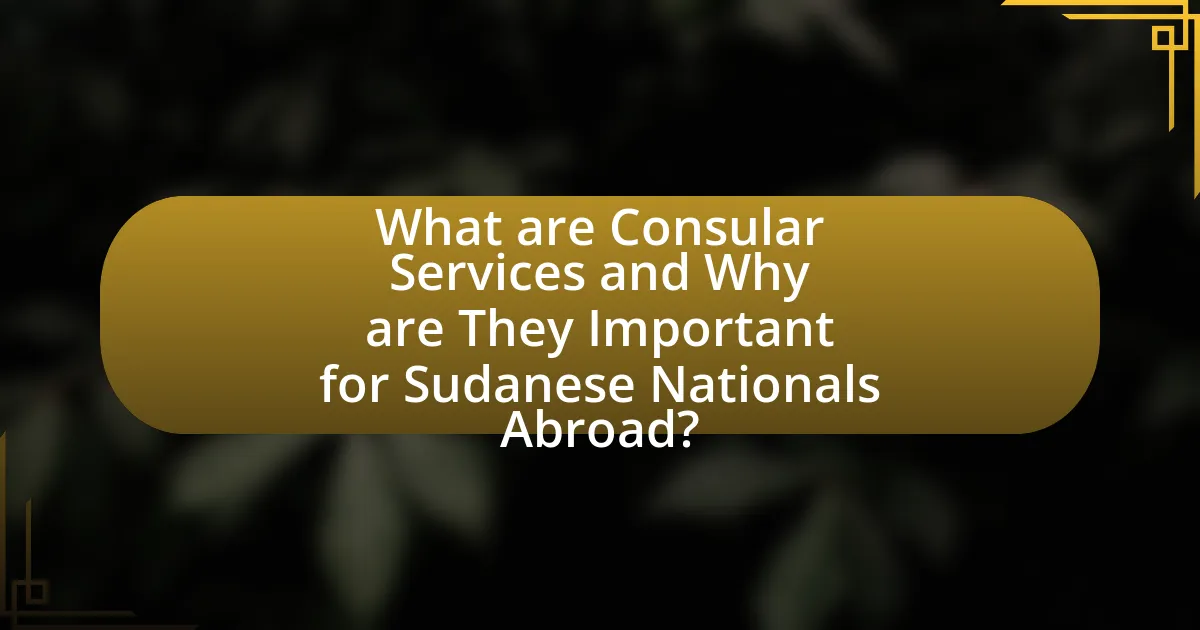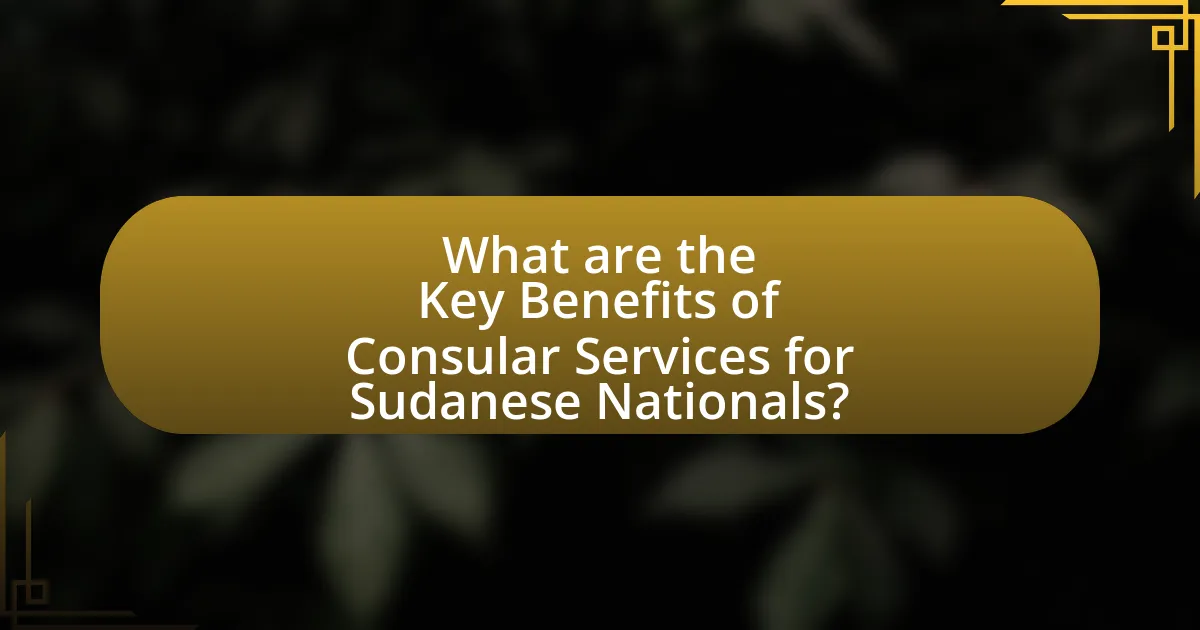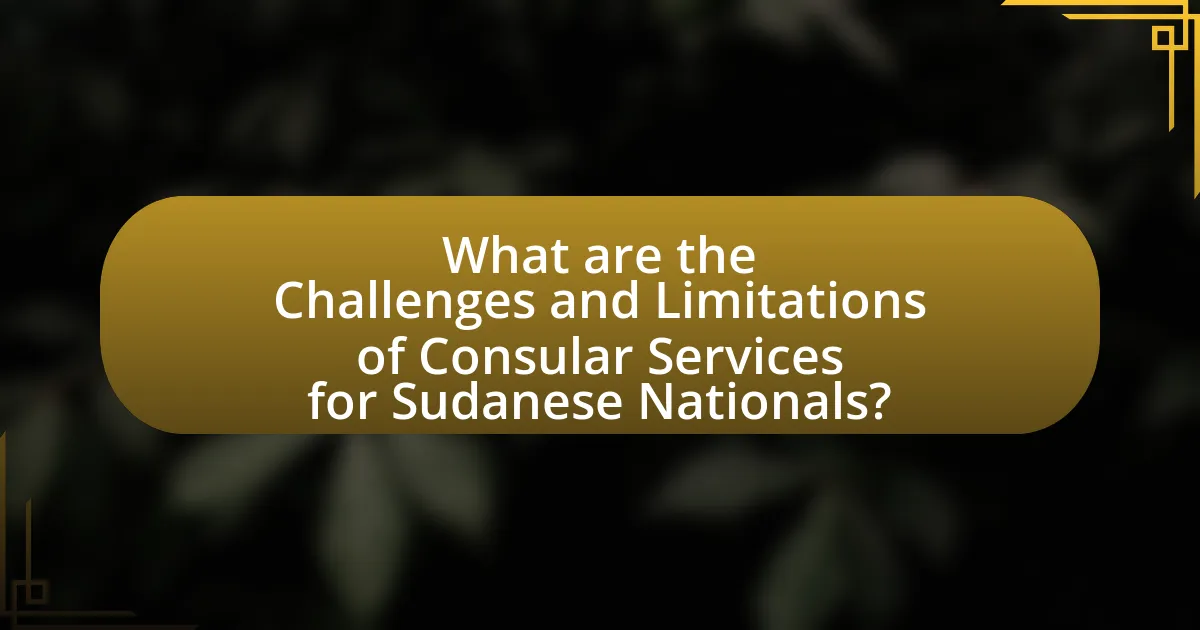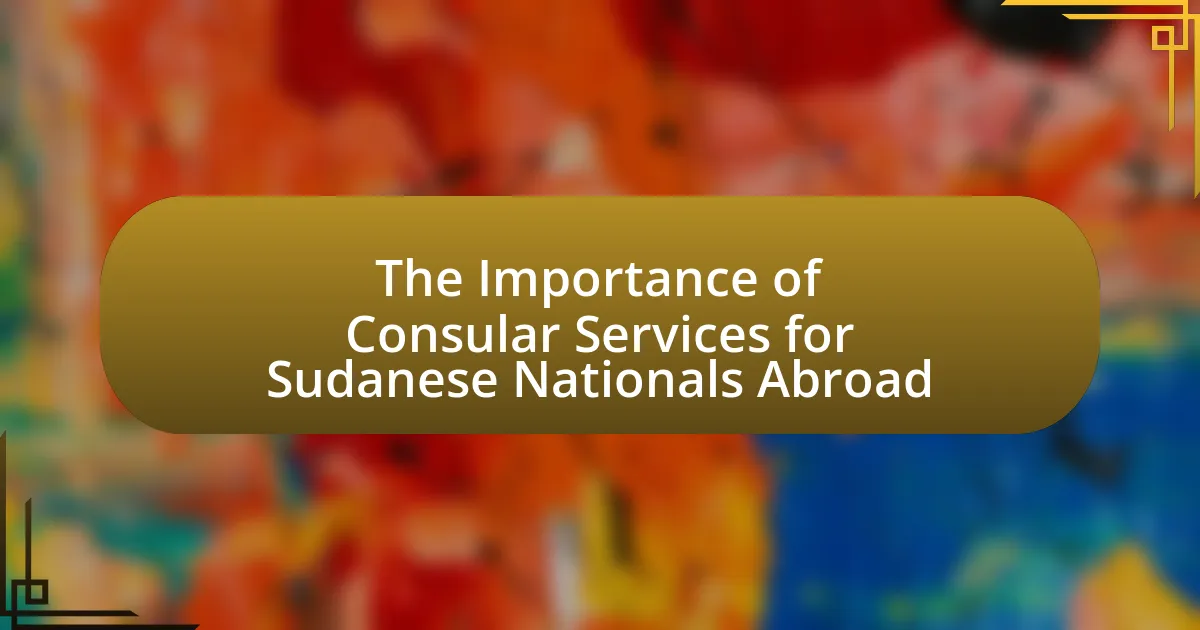Consular services are official support mechanisms provided by a country’s diplomatic missions to assist its citizens abroad, particularly important for Sudanese nationals. These services encompass a range of essential functions, including passport issuance, legal assistance, and emergency support during crises. The article highlights the significance of these services in ensuring the safety and well-being of Sudanese citizens while navigating foreign environments, addressing challenges faced without consular support, and detailing the specific resources available through consulates. Additionally, it discusses the variations in service accessibility based on diplomatic relations and the obstacles Sudanese nationals encounter when seeking assistance.

What are Consular Services and Why are They Important for Sudanese Nationals Abroad?
Consular services are official services provided by a country’s diplomatic missions to assist its citizens abroad, including Sudanese nationals. These services are crucial for Sudanese nationals as they offer support in emergencies, such as legal issues, lost passports, and medical emergencies, ensuring their safety and well-being while living or traveling outside Sudan. For instance, the Sudanese embassy can facilitate the issuance of travel documents and provide guidance on local laws, which is essential for protecting the rights and interests of Sudanese citizens in foreign countries.
How do Consular Services function for Sudanese Nationals?
Consular services for Sudanese nationals function by providing essential support and assistance to citizens living or traveling abroad. These services include issuing passports, providing legal assistance, and facilitating emergency support in cases of distress, such as loss of documents or medical emergencies. For instance, the Sudanese embassy or consulate can issue emergency travel documents to citizens who have lost their passports while overseas, ensuring they can return home safely. Additionally, consular services help Sudanese nationals navigate local laws and regulations, offering guidance on legal matters and connecting them with local legal resources when necessary.
What specific services do consulates provide to Sudanese citizens?
Consulates provide essential services to Sudanese citizens, including passport issuance and renewal, assistance with legal matters, and support in emergencies. These services ensure that Sudanese nationals abroad can maintain their legal status, receive help during crises, and access necessary documentation. For instance, consulates facilitate the issuance of travel documents, which is crucial for Sudanese citizens who may face difficulties in foreign countries. Additionally, they offer guidance on local laws and regulations, helping citizens navigate legal challenges effectively.
How do these services vary by country?
Consular services for Sudanese nationals vary significantly by country, influenced by factors such as diplomatic relations, local laws, and the presence of Sudanese embassies or consulates. For instance, in countries with strong diplomatic ties to Sudan, such as Egypt and Saudi Arabia, Sudanese nationals often receive comprehensive support, including assistance with legal issues, passport renewals, and emergency services. Conversely, in countries with limited diplomatic relations, such as the United States or certain European nations, services may be restricted, leading to challenges in accessing necessary support. This disparity is evident in the number of consular staff available and the range of services offered, which can directly impact the well-being of Sudanese citizens abroad.
Why is access to Consular Services crucial for Sudanese Nationals?
Access to Consular Services is crucial for Sudanese Nationals because it provides essential support in legal, financial, and emergency situations. These services include assistance with passport renewals, legal representation, and help during crises, such as natural disasters or political unrest. For instance, during the 2019 Sudanese revolution, consulates played a vital role in ensuring the safety and well-being of Sudanese citizens abroad by facilitating communication and providing necessary resources. This support is particularly important given the challenges Sudanese Nationals may face in foreign countries, including discrimination or lack of familiarity with local laws.
What challenges do Sudanese Nationals face without consular support?
Sudanese nationals face significant challenges without consular support, including difficulties in accessing legal assistance, lack of protection in cases of arrest or detention, and obstacles in obtaining essential documents like passports or birth certificates. The absence of consular services can lead to increased vulnerability to exploitation and abuse, as individuals may lack guidance on local laws and regulations. Furthermore, without consular intervention, Sudanese nationals may struggle to receive aid during emergencies, such as natural disasters or political unrest, which can exacerbate their precarious situations abroad.
How do consular services assist in emergencies for Sudanese citizens?
Consular services assist Sudanese citizens in emergencies by providing essential support such as legal assistance, evacuation coordination, and access to medical care. In situations like natural disasters, political unrest, or personal crises, consulates can facilitate communication with local authorities, help secure necessary documentation, and connect citizens with local resources. For instance, during the 2011 South Sudan conflict, Sudanese consulates played a crucial role in evacuating citizens and ensuring their safety, demonstrating the vital function of consular services in protecting nationals abroad.

What are the Key Benefits of Consular Services for Sudanese Nationals?
The key benefits of consular services for Sudanese nationals include assistance with legal matters, protection of rights, and facilitation of travel. Consular services provide legal support in cases of arrest or detention, ensuring that Sudanese citizens receive fair treatment under local laws. Additionally, these services help protect the rights of Sudanese nationals abroad, offering guidance in emergencies such as natural disasters or political unrest. Furthermore, consulates assist with passport renewals and provide vital information regarding travel regulations, which is essential for safe and compliant international travel.
How do Consular Services enhance the safety of Sudanese Nationals abroad?
Consular services enhance the safety of Sudanese nationals abroad by providing essential support and protection in emergencies. These services include offering legal assistance, facilitating communication with local authorities, and providing guidance on safety protocols in foreign countries. For instance, during crises such as natural disasters or civil unrest, consulates can coordinate evacuation efforts and ensure that Sudanese citizens receive necessary medical care. Additionally, consular services maintain updated information on travel advisories and local laws, which helps Sudanese nationals navigate potential risks effectively. This proactive approach significantly reduces vulnerabilities and enhances the overall safety of Sudanese citizens living or traveling abroad.
What role do consulates play in legal matters for Sudanese citizens?
Consulates assist Sudanese citizens in legal matters by providing essential services such as legal advice, document authentication, and support in navigating foreign legal systems. They facilitate communication between Sudanese nationals and local authorities, ensuring that citizens understand their rights and obligations under local laws. For instance, consulates can help Sudanese citizens who face legal issues abroad by connecting them with local legal representation and offering guidance on legal procedures. This support is crucial, especially in countries where Sudanese citizens may encounter language barriers or unfamiliar legal frameworks.
How do consular services facilitate travel and documentation for Sudanese Nationals?
Consular services facilitate travel and documentation for Sudanese nationals by providing essential services such as passport issuance, visa assistance, and emergency support. These services ensure that Sudanese citizens can obtain necessary travel documents, which are crucial for international travel. For instance, consulates help in processing passport applications, which typically require verification of identity and citizenship, thereby enabling Sudanese nationals to travel legally. Additionally, consular services offer guidance on visa requirements for various countries, helping individuals navigate complex immigration processes. In emergencies, such as loss of passport or legal issues abroad, consulates provide critical support, including legal assistance and repatriation services, ensuring the safety and well-being of Sudanese nationals while they are outside their home country.
What resources are available through Consular Services for Sudanese Nationals?
Consular Services for Sudanese Nationals provide essential resources such as passport issuance, legal assistance, and emergency support. These services ensure that Sudanese citizens abroad can obtain necessary documentation, receive guidance on legal matters, and access help during crises, such as natural disasters or political unrest. For instance, the Sudanese embassy can facilitate the renewal of passports and assist in cases of lost or stolen documents, which is crucial for maintaining legal status in foreign countries.
What types of information can consulates provide to Sudanese citizens?
Consulates can provide Sudanese citizens with essential information regarding legal assistance, passport services, and emergency support. They offer guidance on local laws, help with documentation for travel, and assist in cases of arrest or detention. Additionally, consulates inform citizens about health services, safety advisories, and local resources available in the host country. This support is crucial for Sudanese nationals navigating foreign environments, ensuring their rights and welfare are protected while abroad.
How can Sudanese Nationals access these resources effectively?
Sudanese nationals can access consular resources effectively by utilizing the services provided by Sudanese embassies and consulates located in their host countries. These diplomatic missions offer essential services such as passport renewal, legal assistance, and emergency support. For instance, the Sudanese Embassy in Washington, D.C., provides a range of services tailored to the needs of Sudanese citizens, including guidance on legal matters and assistance in emergencies. Accessing these resources can be further facilitated by visiting the official embassy website for information on required documentation and appointment scheduling, ensuring that Sudanese nationals are well-prepared when seeking assistance.

What are the Challenges and Limitations of Consular Services for Sudanese Nationals?
The challenges and limitations of consular services for Sudanese nationals include inadequate resources, limited accessibility, and bureaucratic inefficiencies. These issues hinder the ability of Sudanese citizens to receive timely assistance, such as passport renewals and emergency support. For instance, many Sudanese nationals face difficulties in reaching consulates due to geographic barriers and political instability, which can delay critical services. Additionally, the consular staff often operate under constrained budgets, limiting their capacity to address the needs of a growing diaspora. These factors collectively contribute to a diminished effectiveness of consular services for Sudanese nationals abroad.
What obstacles do Sudanese Nationals encounter when seeking consular assistance?
Sudanese nationals encounter several obstacles when seeking consular assistance, including bureaucratic inefficiencies, limited access to information, and security concerns. Bureaucratic inefficiencies often result in long wait times and complicated procedures, making it difficult for individuals to receive timely help. Limited access to information can hinder Sudanese nationals from understanding their rights and the services available to them, as many may not have access to the internet or reliable communication channels. Additionally, security concerns in conflict-affected areas can restrict movement and access to consulates, further complicating the process of obtaining assistance. These challenges highlight the need for improved consular services tailored to the specific circumstances faced by Sudanese nationals abroad.
How do language barriers affect access to consular services?
Language barriers significantly hinder access to consular services by preventing effective communication between consular staff and individuals seeking assistance. When Sudanese nationals abroad encounter language obstacles, they may struggle to understand the services available, the documentation required, or the procedures to follow, leading to delays or inability to receive necessary support. For instance, a study by the International Organization for Migration found that language difficulties can result in a 30% increase in the time taken to process consular requests, illustrating the direct impact of communication challenges on service accessibility.
What are the limitations of consular services in certain regions?
Consular services in certain regions face limitations such as restricted access, inadequate resources, and political instability. For instance, in conflict zones or areas with strained diplomatic relations, consulates may have limited operational capabilities, affecting their ability to provide essential services like emergency assistance or passport renewal. Additionally, regions with high security risks may prevent consular staff from safely reaching their nationals, further hindering support. These limitations are evident in countries experiencing civil unrest, where consular operations can be severely disrupted, impacting the safety and well-being of nationals abroad.
How can Sudanese Nationals overcome challenges related to Consular Services?
Sudanese nationals can overcome challenges related to consular services by utilizing online resources and establishing direct communication with their embassies or consulates. Accessing official websites provides essential information on services, requirements, and procedures, which can streamline the process. Additionally, engaging with consular staff through phone or email can clarify specific issues and expedite assistance. For instance, the Sudanese Ministry of Foreign Affairs offers a dedicated portal for citizens abroad, which includes contact information and service details, enhancing accessibility and support for Sudanese nationals facing consular challenges.
What strategies can Sudanese citizens employ to ensure they receive adequate consular support?
Sudanese citizens can ensure they receive adequate consular support by proactively registering with their embassy or consulate upon arrival in a foreign country. This registration allows consular officials to provide timely assistance in emergencies, such as natural disasters or political unrest. Additionally, maintaining updated contact information with the consulate ensures that citizens can be reached for important notifications or support services. Engaging with the consulate through regular communication, such as attending community events or informational sessions, fosters a relationship that can facilitate better support. Furthermore, being aware of the specific services offered by the consulate, such as legal assistance or emergency travel documents, empowers citizens to seek help effectively when needed.
How can community organizations assist Sudanese Nationals in accessing consular services?
Community organizations can assist Sudanese nationals in accessing consular services by providing information, resources, and support tailored to their specific needs. These organizations often have established networks and partnerships with consulates, enabling them to facilitate communication and streamline the process for individuals seeking assistance. For instance, they can organize workshops to educate Sudanese nationals about the necessary documentation and procedures required for consular services, thereby reducing confusion and delays. Additionally, community organizations may offer translation services to help bridge language barriers, ensuring that Sudanese nationals fully understand the consular processes. This support is crucial, as many Sudanese nationals may face challenges navigating bureaucratic systems in foreign countries.
What are the Best Practices for Sudanese Nationals to Utilize Consular Services Effectively?
Sudanese nationals can utilize consular services effectively by preparing necessary documentation and understanding the services available. First, they should gather essential documents such as passports, identification cards, and any relevant legal papers before visiting the consulate. This preparation ensures that they can access services like passport renewal, legal assistance, or emergency support without delays. Additionally, Sudanese nationals should familiarize themselves with the specific services offered by their consulate, which may include notary services, assistance in emergencies, and information on local laws. Engaging with the consulate’s website or contacting them directly can provide clarity on procedures and requirements. By being well-informed and organized, Sudanese nationals can maximize the benefits of consular services while abroad.

Leave a Reply